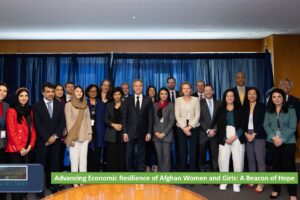In 2021, the Taliban arrested more than 40 members of the Ahmadiyya Muslim community in Afghanistan, exacerbating the longstanding persecution faced by this religious group. Following intervention by the United Nations Assistance Mission in Afghanistan (UNAMA) and the U.S. State Department, these detained individuals were released.
this intervention did not mark the end of their suffering. The Taliban subsequently forced the Ahmadiyya community, numbering around 1,200 people, to leave Afghanistan, effectively exiling them from their homeland.
The Ahmadiyya community, an Islamic sect founded by Mirza Ghulam Ahmad in the late 19th century, has a troubled history in Afghanistan. Ahmad’s movement, which he claimed was the fulfillment of the prophecy of the Mahdi and Messiah, has been widely regarded as heretical by mainstream Muslim groups. This belief has led to severe consequences for Ahmadis in Afghanistan over the years.
The earliest contact between the Ahmadiyya movement and the Pashtun people, within what are now the boundaries of modern Afghanistan, occurred during Mirza Ghulam Ahmad’s lifetime. By the early 1900s, Ahmadis faced violent opposition. Between 1901 and 1903, two prominent Ahmadi Muslims were stoned to death in Kabul, a grim precursor to the enduring hostility they would face.
In 1924-1925, under the reign of Emir Amanullah Khan, affiliation with Ahmadiyya beliefs was declared a capital offense. Converts to Ahmadiyya Islam were forcibly reverted to mainstream Islam or faced severe penalties, including death. This decree institutionalized the persecution of Ahmadis, setting a dangerous precedent for future treatment.
The arrests in 2021 were a stark reminder of the precarious situation faced by Ahmadis in Afghanistan. Over 40 members of the community were detained by the Taliban, who have historically been hostile towards religious minorities, including the Ahmadiyya.
The international community, led by UNAMA and the U.S. State Department, intervened, applying diplomatic pressure on the Taliban to secure the release of the detainees. This intervention highlighted the critical role of international organizations in protecting vulnerable populations under repressive regimes.
Despite their release, the ordeal for the Ahmadiyya community was far from over. The Taliban issued a mandate forcing approximately 1,200 Ahmadis to leave Afghanistan. This forced migration underscores the relentless persecution faced by Ahmadis, who are compelled to seek refuge elsewhere due to their religious beliefs.
The Ahmadiyya community’s plight in Afghanistan is a tragic chapter in their history. Despite international advocacy and intervention, Ahmadis continue to face systemic discrimination and violence. Since 2021, religious communities like the Ahmadiyya Muslims have claimed that they have received no substantial assistance, underscoring the ongoing neglect and the urgent need for sustained international support and intervention.
The persecution of Ahmadiyya Muslims in Afghanistan is a dire human rights issue that demands global attention. The 2021 arrests and subsequent forced exile of Ahmadiyya community members reflect a broader pattern of religious intolerance and violence that has plagued Afghanistan for over a century. While international efforts have provided some relief, the need for comprehensive and sustained support for the Ahmadiyya community remains critical. Ensuring their safety and right to practice their faith without fear is a moral imperative for the international community.





